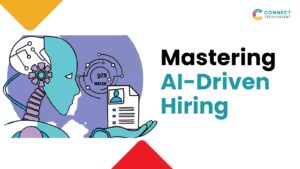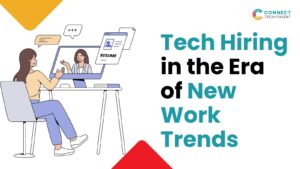Hiring the best talent has always been a challenging task for most businesses. Particularly with leaner teams and reduced budgets, the level of challenge has increased further. If the recruitment teams usually try to do their best to find the right candidate in a pool full of talent, you would agree that the options are quite limited. The final decision ultimately gravitates towards either finding the best person at that time or looking longer for the best fit for the open job position.
Since it is not always about the number of candidates who apply for a job, you are left with two ways to proceed with the hiring – direct hiring or involving a staffing agency to shortlist the right candidates for your business. As per PWC statistics, nearly 49% of job seekers turn down offers because of bad experiences during the hiring process, which makes it even more important to plan for direct hiring carefully. On the other hand, around half of all hiring managers want to increase their use of staffing firms through 2023 (Source).
In most cases, the talent environment for organizations constantly changes with the availability of new jobs. Hence, it is important for you to understand the differences between direct hiring and hiring individuals via a staffing agency.
In this guide, we will help explore these two faces of recruitment planning.
What is Direct Hiring?
Direct hiring refers to the process that involves offering a job to potential candidates directly without involving a third party. It is different from temporary hiring or contract positions which mostly involve a staffing agency to supply and employ the required workforce.
Direct hire jobs are usually long-term or permanent positions and pay good compensation and benefits in line with industry standards, including paid time off, health insurance, retirement savings, and many others. Also, the process involved here can take more time than filling temporary positions rapidly. This is because you, as an employer, would want to interview strong candidates thoroughly before committing to any long-term relationship.
Examples of Direct Hiring
There are many roles that tend to be hired directly more often. These include:
Job positions that require a specialized level of education
Positions for tech roles require a specialized level of knowledge and training to perform well. Most employers want to retain employees in these positions for the long term and so prefer direct hiring for these roles.
Management and executive positions
Individuals working in senior executive and management positions are expected to stick around for a while. Hiring them directly through the in-house process tends to foster trust and longevity.
Pros and Cons of Direct Hiring
When considering direct hiring, it is important to weigh the value it brings against its costs. Here are some of the pros and cons:
Benefits of Direct Hire
- Direct hiring can attract a broader pool of qualified professionals, many of whom may choose to apply for a long-term role rather than a contract job.
- It leads to higher commitment and employee retention, which is a challenge during the Great Resignation.
- You need not depend on an external source of talented candidates to fulfill the hiring requirements.
Disadvantages of Direct Hiring
- There is a significant cost involved in maintaining the direct hiring process within an organization. This includes creating job postings on various job boards, maintaining the hiring team, putting the hired candidates on payroll, etc. For many small companies, this can result in a hefty expense which is not feasible.
- If you are open to hiring the perfect candidate from a location far from your business offices, you may also need to provide relocation expenses.
- The length or duration of the hiring process also determines the total cost involved. In case hiring the right candidate takes longer than usual, you will need to accommodate the related expenses within your hiring budget.
The Direct Hire Process
In general, the direct hiring process involves four main steps:
1. Network utilization to source potential candidates
Most hiring teams maintain an extensive network of candidates. Along with it, they have an existing database that includes the details of those who left the organization, those who want to join your organization, and those who have previously applied for a job but didn’t get it. From this broad pool of talent, you can then select the most suitable candidates and approach them for a direct hire.
2. Candidate screening based on qualification and experience
Once you/your team has reached out to potential candidates or received job applications from experienced professionals, it is time to screen them. This is important to understand their behavior and know if they will be a good fit for the role and your company’s culture.
3. Final interview of shortlisted candidates
After you have trimmed down the candidate list from the initial screening, you can proceed with the final interview to understand their individual background.
4. Making an offer to fill the position
To close the deal, put together an attractive compensation package including benefits.
What is a Staffing Agency?
A staffing agency, also known as a staffing firm or recruitment firm, is an organization that matches companies with the right candidates. By hiring a staffing agency, most companies can simplify the process of finding the right people for different job openings. This saves time and uncovers potential candidates that you may not find on your own. If your current hiring process is not well-defined and takes too much time, you can benefit from hiring a staffing agency.
Staffing firms overcome many of the challenges related to finding qualified talent. Reviewing hundreds of applications, interviewing candidates, and negotiating the compensation package takes away precious time from your existing obligations, but staffing firms will handle all of these for you.
Pros and Cons of Hiring a Staffing Agency
Here are three main benefits of utilizing the services of a hiring agency:
1. Faster hiring
With a staffing agency, you can shorten the average time needed to fill open job positions. You need not spend time attracting candidates or going through hundreds of applications/profiles to find a few qualified candidates.
2. Better hiring quality
Most staffing agencies have a significant talent pool that contains pre-screened candidates. As a result, you can easily find candidates that are carefully screened using best practices.
3. Specialized recruiting
Staffing agencies specialize in hiring candidates for a particular industry, roles, or hiring levels. They have a good understanding and knowledge of the targeted job market segments. They can also provide you with valuable insights that help in hiring better candidates.
On the other hand, taking the staffing agency route to hiring also has potential downsides:
1. Associated costs
Hiring a staffing agency can become quite expensive in some cases. The cost may also increase further if you want to hire for a hard-to-fill role.
2. Lack of cultural fit
While a recruitment agency can deliver the best-fit candidates, they may not always be able to accurately assess the cultural fit.
3. Lack of employer branding
If you hire a staffing agency, you can miss the opportunity to build and promote the employer’s brand. With direct hiring, you can use it to promote the organization as an emoloyer of choice.
Process Followed By Staffing Agencies
Unlike the direct hiring process, the process of hiring candidates via staffing agencies involves the following steps:
- Profiling
Here, the staffing agency will meet you to discuss the specific hiring needs. Here, the agency’s goal is to get as many details as possible about the positions to be filled.
- Sourcing
The agency then scours its database and networks to find qualified candidates and then screens them up to set up interviews.
- Interview
Here, the agency first arranges interviews with candidates, and then the final interview round will be held by your team.
- Offer extension and negotiation
Once you finalize the candidates, they will handle offers and negotiations with the candidates on your behalf.
- Onboarding
Once a candidate accepts the offer, the chosen staffing agency will also assist your company with employee onboarding in your organization.
Direct Hiring Vs. Staffing Agency: Which Way to Go?
Both direct hiring and hiring via a staffing agency have benefits in building your workforce. The best part – it is up to you to decide which way you want to go. To streamline the process and make the right choice for your company, consider the following factors:
- Time it takes to recruit for a specific role
- In-house resource availability for hiring
- Particular skills needed for senior executive roles
- Availability of talent pool
- Niche or industry your business falls into
Let Connect Tech+Talent Do The Hard Work in Hiring Potential Candidates for You
The need for direct hiring or selecting a staffing agency may vary from one business to another. If you are looking to make the hiring process easier and more efficient, Connect Tech+Talent is a leading staffing agency that can help your organization with focused hiring. To learn more about Connect Tech+Talent, click here.




